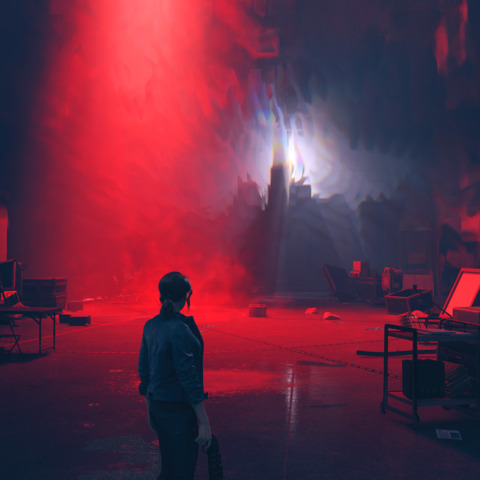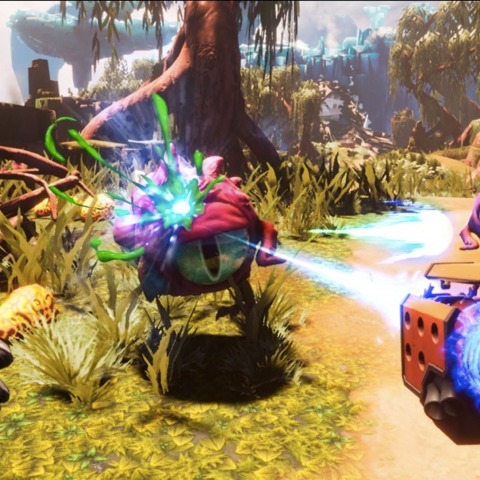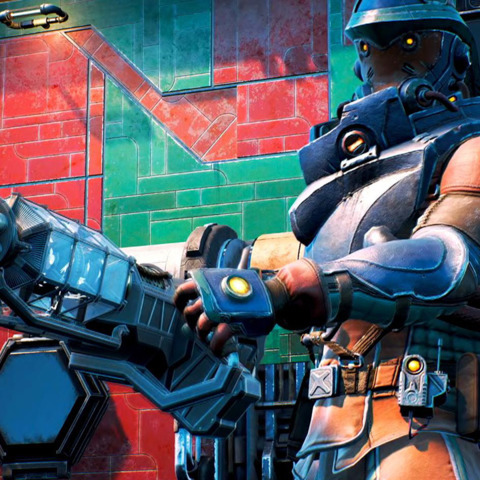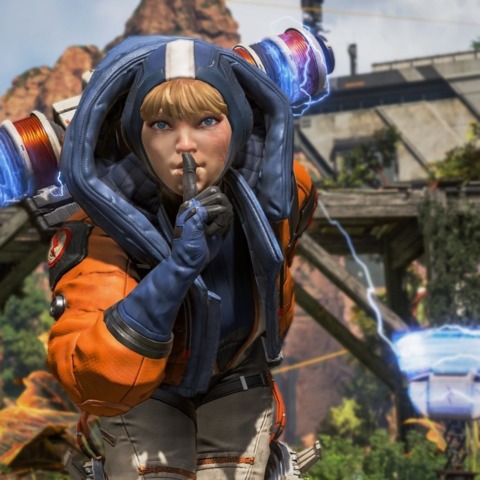With this year's installment of the Call of Duty franchise, Infinity Ward is returning to its most famous and beloved entry in the series: Call of Duty Modern Warfare. But unlike 2016's remaster of the 2007 classic, 2019's version is a reimagining of the original game. Infinity Ward is updating its past work to be relevant to our current, real world, and according to developers, the game isn't shying away from the implications that relevancy brings to the biggest first-person shooter franchise in video games. (Infinity Ward is also making some major changes to how Call of Duty multiplayer works, introducing cross-play between PS4, Xbox One, and PC players, and doing away with the traditional season pass that locked post-launch maps to a portion of the playerbase.)
Before its announcement that Modern Warfare was on its way, Infinity Ward invited journalists to its studio last week to get an early look at the title before its announcement. There, studio narrative director Taylor Kurosaki and single player director Jacob Minkoff explained this new game as a more mature, authentic, and relevant Call of Duty game that's not a superhero caricature, but a down-to-earth representation of the realities of being a soldier. It's taking scenarios that are "ripped from the headlines." Among the stated goals for the game's campaign: "Create an emotional connection through the realities of war," and "Push the boundaries of the medium."
Both Kurosaki and Minkoff formerly worked at Naughty Dog, a studio known for the narrative focus of its games, and in short, they're looking to make a Call of Duty that's about more than just shooting various enemies as they pop out of cover. It's not the first time the franchise has tried to tell deep, affecting stories about war that might make players ask themselves questions about the power fantasy about being a soldier. But Modern Warfare does appear to be the most ambitious.
Big-budget video game franchises often struggle to commit to themes, messages, and ideas--especially controversial or political ones. GameSpot sat down with Kurosaki to talk about what Infinity Ward is trying to achieve with Call of Duty: Modern Warfare, why it decided to reboot the game, and what kind of story it's looking to tell.

GameSpot: In re-imagining the story of Call of Duty: Modern Warfare to be relevant in the world today, what does that mean to you? What are you pulling from? In the presentation, you used the phrase “ripped from the headlines" a lot--what does that mean in terms of Call of Duty?
Taylor Kurosaki: Sure, well, the original game was ripped from the headlines. But it was ripped from the headlines of 2007. And now, here we are 12 years later, and the world has further changed. I would say that compared to 2007, the [Operation Iraqi Freedom] or whatever it was, that was kind of traditional warfare. Those were guys in tanks, fighting other guys in tanks and Jeeps, and this side wore this uniform and this other side wore a different uniform, and this side flew this flag, and the other side flew the other flag.
Today, modern warfare means that the war isn't just over there. That the war is everywhere. It's in our own backyards. It's in places that can suddenly become a battlefield at a moment's notice. It's about enemies who don't wear uniforms. It's about civilian collateral damage kind of being, unfortunately, part of the equation. When we set out to make this game, we asked ourselves a very literal question. We just said, 'What do the words modern warfare mean in 2019?' Not what does the game name mean, but those words as just words: modern warfare. And for us, it meant that a busy city center could be the site of a terrorist attack. That a residential compound could be the safe house of a terror cell, that commandos have to go into and eliminate the cell. It means that it's not only sort of John Wayne-style American G.I.s, but it's also local militias and freedom fighters. Where families are hit by airstrikes and people have to pick up the pieces by picking up arms and fighting for their own independence. That, to us, was the definition of modern warfare and if we didn't have all of those elements in this game, we wouldn't be doing justice to that name.
And every character in this game goes through that journey where they ask themselves, 'How far am I willing to go in order to achieve my own greater good?'"
Are there any particular real-world events that you're actually pulling from?
Sure. I mean, it's important to say that we are not trying to be sensationalist. We are not kind of making carbon copies of specific events that we see in the news. It's more about the situations. It's more about the themes. If anything, the kinds of things that we are inspired by are current-day war stories. Films like Lone Survivor or The Hurt Locker or American Sniper or even Sicario. These are all films that have come out since Modern Warfare 3. These are all films about protagonists trying to achieve whatever they define as their own version of the greater good by navigating a very complex world where there is no black and white, only the gray in between. Those are the kinds of things that we are inspired by.
And every character in this game goes through that journey where they ask themselves, "How far am I willing to go in order to achieve my own greater good?" And the answer for each and every character is different, and it depends on their own perspective. And we wouldn't be kind of utilizing the platform of game making if only the story was about that, but the gameplay was just kind of generic shooter gameplay. That not only do these characters have to ask themselves, "How far am I willing to go?" But the player that's playing this game has to ask themselves, "How far am I willing to go?" That's the true kind of magic of storytelling and games is that players get to occupy the shoes of these characters. They get to be in their skin and we get to put them in tough situations that mimic the kind of tough situations that those characters are put in.
It seems like a tough balancing act: trying to make the game fun while dealing with these heavy concepts, and trying not to sensationalize them. How do you make sure you're getting across what you're trying to get across, without just leaving the player to be like, "yeah this is great, shooting people down, whatever"?
Well, if you were a soldier and you actually deployed into a theater of war and you shot down a bunch of innocent civilians, you would be arrested and court marshaled, right?
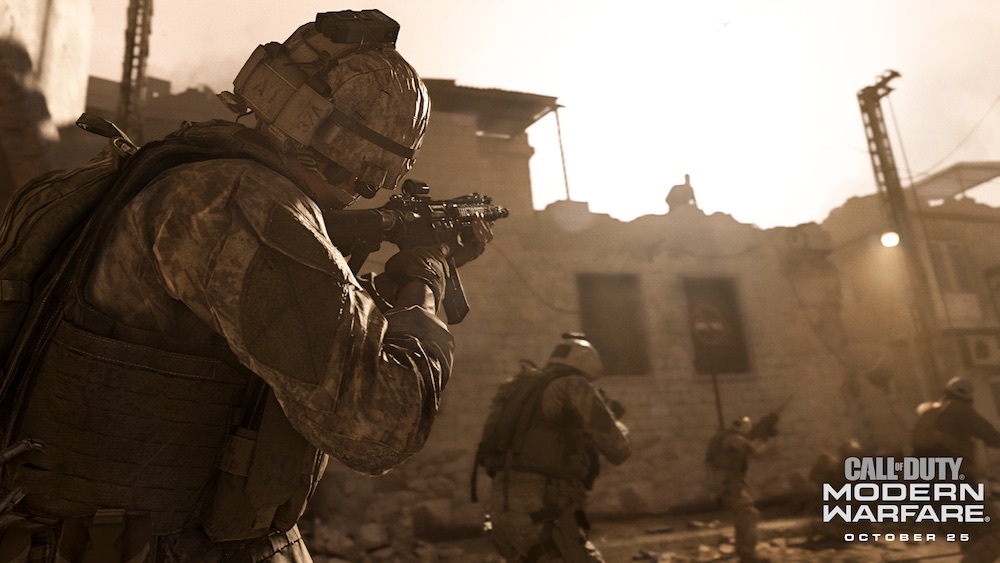
Right.
The game kind of does the same thing. The game does not allow you to get away with going rogue. You have a command structure that you have to follow and orders that you have to follow and if you try to just be a bad apple, the game is going to smack you down for that.
Now, that's not to say that mistakes aren't made. I mean, that's a theme that we've gotten from our military consultants. They've said over and over again that the true story behind being like a Navy SEAL or a Tier 1 operator of that nature is that we, as the public, we expect these guys to go into these very, very difficult situations where the difference between life and death is a split second and the difference between determining what's a threat and what's not a threat is a split second. And they are asked to be perfect. Trying to prosecute situations that are not perfect, inherently. And so they do their best.
And when you're playing this game, I'm assuming that you're going to be doing your best, too. Because it's a hard game with a lot consequence, right? There are stakes. There's lethality. You just kind of blindly jump into a room and you're not checking your corners and you're not being mindful and being strategic about how you enter and how you slice the pie, as they say, and you're going to get owned pretty quick--which is what real war is about. So, yes, it is a fine line to walk. But we want to make something that's different. We want to make something that pushes the medium forward. This is a very young industry that we're in, the games industry. And advancements are made by leaps and bounds quickly. And so why not be at the forefront of making, of pushing the medium forward? If you're going to just play it safe and throw a fastball, then what's the point of doing it? What's the point of doing all this work?
And you know, frankly, some of the best narratives happen when not only the characters are confronted with a certain challenge, but the players are too. And also the developers. So we are also kind of finding our line as we go, as well. So, putting ourselves in the shoes of not only the characters and the players during the production of this game. I mean, that's a challenge as well and it's definitely one that we're up for.
You mentioned that the game kind of kicks back at you if you're going rogue. That's an old Call of Duty thing, where if you shoot your allies or civilians, you fail out of the mission. Is it that sort of thing again, or is there something more to it?
Well, there is more to it, again. Like I said, the Navy SEALs that we talked to, they say, "Look. We're expected to be perfect in imperfect situations. And it's impossible to always be perfect." So, no, the game doesn't have a zero tolerance policy. The game understands that you are trying to keep yourself alive, you're trying to keep your squadmates alive, and more importantly, you're trying to make sure you reach mission success. Because that's your goal. And if mistakes are made on the path to reaching mission success, sure, your allies, your squadmates are going to call you out for it. But everyone makes mistakes. So the game, it's not necessarily going to hard-fail you if you make a judgment call, like in the heat of the moment, and maybe upon further review it turns out you were wrong--but only honest mistakes.

Right. And that's just a tough thing to do with a game. And with a game of this fidelity, it can be disturbing.
Part of making this thing relevant to this world that we live in is, we all see things on the news. We see a terror attack, or we see a long, drawn-out war, or these kinds of things where there are civilians caught in the middle. And the difference is, when you play Modern Warfare, when you play this Modern Warfare, you get to suit up with Captain Price and some of his old comrades. And you get to go out there and you actually get to make a difference. We feel like it's actually very empowering for our players to be able to not be sort of paralyzed by what they see out there, but actually say, "I'm going to be one of those guys that has the wherewithal to suit up and go out there and give it my best shot to try to bring about some meaningful change."
You mentioned the idea of the game world reacting to your actions. Just how reactive is it?
It means that you can reach mission success and make a big difference, like you've saved a bunch of people. Or you can reach mission success and unfortunately, there have been heavier losses than there otherwise could have been. So again, hopefully, if we're doing our jobs right, you're going to feel that sense of urgency to make as much of a difference as you possibly can, without crossing your line. And that goes for Captain Price, that goes for the player characters, and that goes for Farah Kareem and her brother Hadir, who are the leaders of this freedom fighter militia.
...The Navy SEALs that we talked to, they say, 'Look. We're expected to be perfect in imperfect situations. And it's impossible to always be perfect.'"
So does that affect how the narrative plays out? Is there any sort of player choice and branching story?
There are choices you can make in this game that do affect the narrative in some ways. But this is not totally like a Choose Your Own Adventure. This is a high-quality, incredibly polished Sicario that you can play. And you cannot have that kind of fidelity and that kind of depth of storytelling and situations if at every turn there are four more permutations of where the narrative can go. This is a classically told story with a beginning, a middle, and an end. But you can affect how things play out sort of in the middle. And of course, just in terms of combat, right? Do you use night vision goggles? Do you use suppressed weapons or do you go loud? Do you creep into rooms cautiously or do you kick the door down, or do you shotgun the door and put a hole in it and throw a flashbang in? These are all of the kind of strategic choices that our players make at all times, tactically, in this really complex battlefield.
A lot of big games have been criticized, especially recently, for almost getting into realistic situations and politics, and then skirting away and not wanting to offend one group or another. Are you thinking about that with this story, and how are you dealing with it?
We're not talking out of both sides of our mouths. We are making a game that is heavily inspired by the world that we live in today and the situations that we see in the world today. Now, like I said earlier, we are not one-to-one reproducing real-world events because I think that would be really unseemly. And we're also not a one-to-one, in some cases, reproducing what are very, very complex conflicts world and trying to boil them down in a way that would be understandable over the duration of the campaign.

So for example, we are inspired heavily by some of the events in Iraq, and in Syria, and with the Arab Spring and even with the Soviet invasion of Afghanistan. There are a lot of similar themes about colonialism and about superpowers exerting their influence in regions through proxy allies and about militias that rise up and terrorist groups. But the one thing that we've done is--we've not specifically said, our main theater of war in our game takes place in a country where we're calling Urzikstan. And that is absolutely by design. And it's not because we want to circumvent someone saying like "Oh, this is a game about Syria," or "This is a game about Iraq." But if we called a country by the real name of a country that exists today, then we would undoubtedly be giving short shrift to these incredibly complex situations that we are in some ways simplifying so that they're more easily grockable.
And again, the themes are what's important here. It's not the sort of slavish dedication to the specific events of all these disparate countries. It's about themes that you see over and over again in these situations. We want to capture the essence of those themes and of those characters thrown into conflict and how they overcome adversity. And so inventing our own country that sort of encapsulates some of these situations down into this more understandable way is the way that we wanted to go. Again, we don't have the runway to have a war where there's 17 different factions and all this 200 years of history and things like that so that's our method for that, is that we can still handle these sort of heady subjects that are delicate without disrespecting the citizens of those war torn states.
Infinity Ward showed off a lot more about Call of Duty: Modern Warfare--here's everything we learned from the studio's lengthy presentation.
